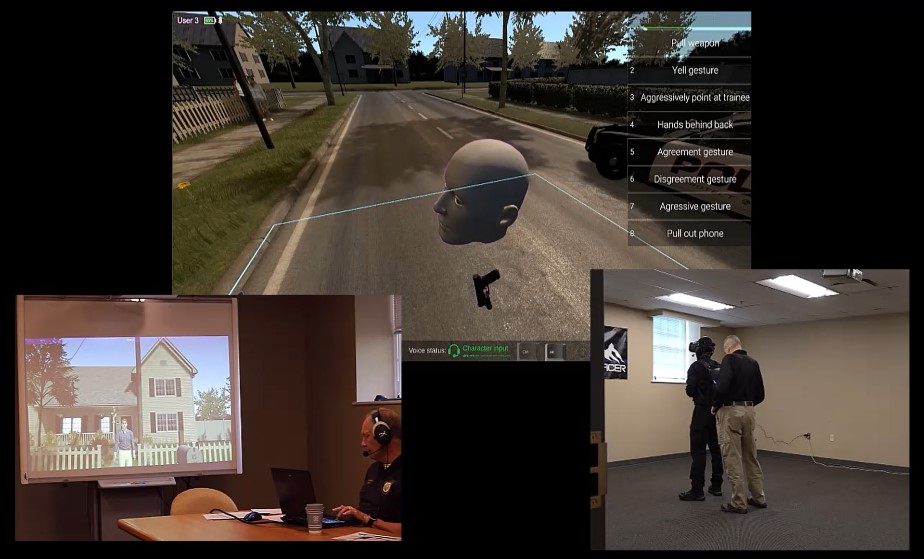Law Enforcement Training Unit
The law enforcement training unit is staffed by seasoned instructors who provide training for both police and correctional officers on a variety of mandated and elective programs. Programs are offered at the Public Safety Education and Training Center in Sykesville and at regional training sites. Programs selected for offering are chosen based on requests from client agencies, changes to state law, and recent court decisions.
In partnership with adjunct instructors, the Police In-Service Training Unit offers several unique programs including Domestic Terrorism, False Documents, Interview and Interrogation, MLEO Conference, and Unmanned Aviation.
For more information on these programs, contact the Registrar or the Director of Law Enforcement Training as listed on the Contact page. You can also reach out to mpctcletu.dpscs@maryland.gov. To view upcoming course postings hosted by the unit, visit the Training Calendar.
Field Training and Evaluation Program
The transition from the police academy to the “real” world is a critical step in the development of law enforcement officers. The field training program is the essential link in that officer development. The program incorporates the best of all models in a manner that is realistic and applicable to the current environment.
This program will highlight the concepts and philosophies that emphasize the training role of a field training officer (FTO). It is the goal of this program to inform students of the skills, knowledge and abilities that are needed to become a FTO. Initially, the program examines the roles of the field training officer – specifically, the fact that the field training officer functions as the supervisor of a field trainee. The program also focuses on the fact that a FTO needs to possess and demonstrate skills in leadership and delegation. Additional components of the program instruct to the following:
Fundamentals of effective communication
- Counseling
- The various roles of an FTO
- Challenges facing the FTO
- Training liability and legal issues
- COMAR field training requirements
- Ethics and integrity
- Adult learning
- Emotional intelligence
- Diversity and generational differences
The program is a combination of classroom instructor and practical application. During the daily practical applications, students will:
- Apply leadership traits and principles to a training situation
- Introduce trainee to field training expectations and standards
- Rehearse counseling skills
- Prepare a remedial training plan for a specific problem
- Review evaluation instruments
Completion of this program satisfies the Police Training & Standards Commission field training officer training requirements (COMAR 12.04.01.17 D (2)).
Field Training Officer Refresher
The Field Training Officer Refresher program highlights the changes in the concepts and philosophies in the training role of a field training officer (FTO). It is the goal of this program to inform students of updates in FTO subjects to enhance their proven skills, knowledge and abilities within the four-year period following their initial FTO training.
Components of the program include:
- Effective communication
- Counseling, Coaching and Mentoring
- Roles of an FTO
- Challenges facing the FTO
- COMAR field training requirements
- Adult learning
This program satisfies the COMAR requirement (COMAR 12.04.01.17 D (1) (e)) of refresher training for certified police field training officers.
SFST Refresher Training
SFST Refresher Training is for law enforcement officers who have successfully completed the NHTSA/IACP-approved DWI Detection and Standardized Field Sobriety Testing Training Program.
Officers can refresh their skills of:
- Recognizing and interpreting evidence of DWI
- Administering and interpreting the scientifically validated sobriety tests
- Describing DWI evidence clearly and convincingly
- Reviewing information regarding recent case law and research studies
RADAR/LIDAR Operator Course
This National Highway Transportation Safety Administration (NHTSA) approved course will enable participants to become proficient in the use of both RADAR and LIDAR units as well as average speed calculation methods. Participants will learn the different scientific principles behind these devices and their proper application within the overall speed enforcement program. In addition, we will cover the various aspects of equipment use, daily testing and verification protocols, along with such operational considerations as case law, health issues, and officer safety.
IED Awareness and Safety
This program is designed for patrol officers as an introduction to Improvised Explosive Devices (IED). Participants will get an overview of various IED and homemade explosive components and the foundational knowledge of functions and classifications. Participants will learn proper safety precautions and procedures for responding to unattended suspicious items. By using model IED and homemade explosives, participants are able to view a real life example of an IED.
In collaboration with the Police Entrance-Level Training Program, the Police In-Service Unit has instituted virtual training to meet the mandated training requirements in both entrance-level and in-service programs. This style of training has been instrumental in continuing meeting agency training needs. The LETU continues to research and develop proactive training methods to further the educational needs for public safety.
Our pilot in-service program, Officer-Community Interaction (Virtual Reality Training), focuses on the different aspects of officers interacting with individuals in the community. Participants will have classroom instruction on de-escalation considerations and techniques, as well as the "necessary and proportional" standard established by the Maryland Use of Force statute. Participants will have hands-on experience with a cutting-edge, scenario-based virtual reality simulator (APEX Officer). This class also features video assessment and evaluation on current mandates that have been the focus of Police Reform.

